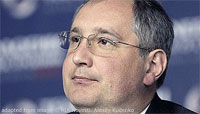Russian deputy PM paints black picture of Ukraine’s future in EU

(Interfax – November 12, 2013) Russian Deputy Prime Minister Dmitriy Rogozin has warned Ukraine that traditional economic ties with Russia will be severed if Ukraine signs an association agreement with the European Union, Russian Interfax news agency reported on 12 November.
Rogozin was speaking at Royal Institute of International Affairs (Egmont) in Brussels on the same day.
Rogozin said: “You are entering a very lengthy process as part of which you will be fulfilling a lot of conditions which will be burdensome for your country, its economy and its industry, without prospects, in the long run, of joining the European Union. This is like sitting in the lobby and never going into the sauna,” he told the Ukrainian ambassador during the debate.
He said that Russia saw its industrial and technological development in cooperation with its neighbours in the former Soviet Union. According to him, Russia’s key partners are not only CSTO member states or the Eurasian Economic Community but also Ukraine, Moldova, and some others.
Rogozin said he was concerned about the Eastern Partnership programme summit to be held in Vilnius in late November.
Rogozin said that, according to the Russian side’s information about the new rules for Ukraine or Moldova after joining the association with the EU, “traditional manufacturing and industrial relations will be disrupted, as well as, for example, our cooperation with Ukraine in the aerospace and aviation industry”.
“We fear these consequences. And it is quite obvious that for the European Union this will also be quite a serious matter. I do not think that the European Union will be expanding forever, stretching as far eastward as possible and incorporating unstable economies,” Rogozin said.
According to Rogozin, for purely pragmatic reasons the EU shouldn’t have done this.
Rogozin also called on the EU and the Moldovan authorities to ponder the consequences of signing an association agreement without involving the Dniester region.
“You should realize that the absence of dialogue between the Republic of Moldova and the Dniester region could unleash the conflict again. And you are acquiring a country with an internal conflict inside your Eastern Partnership,” Rogozin warned.
Speaking about the Eastern Partnership project, which provides for political and economic rapprochement between the EU and Armenia, Azerbaijan, Georgia, Ukraine, Moldova and Belarus, Rogozin said that the EU is accepting “countries which are not only going through an economic crisis but are on the verge of default”.
He also urged the EU not to push Russia away from the Eastern Partnership and to analyse all possible negative consequences for the participating countries – former Soviet republics.
Russia is extremely interested in building very good relations with the European Union, Rogozin said. “This is our closest partner,” Rogozin said. For Russia, there is no alternative to Russia “in terms of political and economic relations” he said.
In his view, while building these strategic relations for the future, both Brussels and Moscow “must be careful and attentive to each other”.
“They must hold the most meticulous consultations on the consequences of unilateral actions in this huge space that used to be called the Soviet Union,” Rogozin said.
According to him, the Russian side would be very grateful if “economic issues remain such, without turning into political pain for those countries which are still developing their statehood”.
Rogozin said he was baffled by the EU’s “radical actions with respect to countries which are not only Russia’s neighbours but also peoples who have always been associated with Russia by common destiny for centuries”. He said he did not understand why it was necessary “to tear them away from their common economic, industrial and cooperative ties, destroy their economy, and then accept them”.
The Russian deputy prime minister urged his European colleagues to be “more cautious with regard to the future of Europe and the European Union”.
According to him, such issues should not be resolved against Moscow’s opinion but to be discussed with it openly and honestly.
“So far I have not seen such a dialogue. We see some fighting behind the scenes and conversations behind Russia’s back on how to use the Eastern Partnership not to make it partnership but, in fact, to realize the notorious historical formula of divide and rule. But will this lead to unity in Europe itself ? I doubt it,” Rogozin said.
